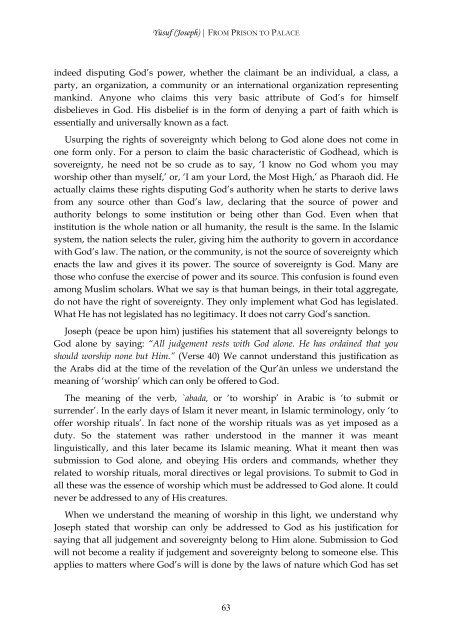Volume 10 Surah 12 - 15 - Enjoy Islam
Volume 10 Surah 12 - 15 - Enjoy Islam
Volume 10 Surah 12 - 15 - Enjoy Islam
You also want an ePaper? Increase the reach of your titles
YUMPU automatically turns print PDFs into web optimized ePapers that Google loves.
Yūsuf (Joseph) | FROM PRISON TO PALACE<br />
indeed disputing God’s power, whether the claimant be an individual, a class, a<br />
party, an organization, a community or an international organization representing<br />
mankind. Anyone who claims this very basic attribute of God’s for himself<br />
disbelieves in God. His disbelief is in the form of denying a part of faith which is<br />
essentially and universally known as a fact.<br />
Usurping the rights of sovereignty which belong to God alone does not come in<br />
one form only. For a person to claim the basic characteristic of Godhead, which is<br />
sovereignty, he need not be so crude as to say, ‘I know no God whom you may<br />
worship other than myself,’ or, ‘I am your Lord, the Most High,’ as Pharaoh did. He<br />
actually claims these rights disputing God’s authority when he starts to derive laws<br />
from any source other than God’s law, declaring that the source of power and<br />
authority belongs to some institution or being other than God. Even when that<br />
institution is the whole nation or all humanity, the result is the same. In the <strong>Islam</strong>ic<br />
system, the nation selects the ruler, giving him the authority to govern in accordance<br />
with God’s law. The nation, or the community, is not the source of sovereignty which<br />
enacts the law and gives it its power. The source of sovereignty is God. Many are<br />
those who confuse the exercise of power and its source. This confusion is found even<br />
among Muslim scholars. What we say is that human beings, in their total aggregate,<br />
do not have the right of sovereignty. They only implement what God has legislated.<br />
What He has not legislated has no legitimacy. It does not carry God’s sanction.<br />
Joseph (peace be upon him) justifies his statement that all sovereignty belongs to<br />
God alone by saying: “All judgement rests with God alone. He has ordained that you<br />
should worship none but Him.” (Verse 40) We cannot understand this justification as<br />
the Arabs did at the time of the revelation of the Qur’ān unless we understand the<br />
meaning of ‘worship’ which can only be offered to God.<br />
The meaning of the verb, `abada, or ‘to worship’ in Arabic is ‘to submit or<br />
surrender’. In the early days of <strong>Islam</strong> it never meant, in <strong>Islam</strong>ic terminology, only ‘to<br />
offer worship rituals’. In fact none of the worship rituals was as yet imposed as a<br />
duty. So the statement was rather understood in the manner it was meant<br />
linguistically, and this later became its <strong>Islam</strong>ic meaning. What it meant then was<br />
submission to God alone, and obeying His orders and commands, whether they<br />
related to worship rituals, moral directives or legal provisions. To submit to God in<br />
all these was the essence of worship which must be addressed to God alone. It could<br />
never be addressed to any of His creatures.<br />
When we understand the meaning of worship in this light, we understand why<br />
Joseph stated that worship can only be addressed to God as his justification for<br />
saying that all judgement and sovereignty belong to Him alone. Submission to God<br />
will not become a reality if judgement and sovereignty belong to someone else. This<br />
applies to matters where God’s will is done by the laws of nature which God has set<br />
63

















